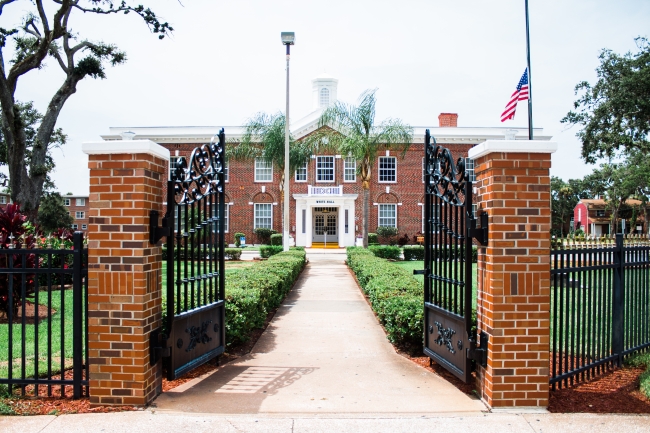You have /5 articles left.
Sign up for a free account or log in.

Bethune-Cookman University
Pressure mounted against Bethune-Cookman University leaders from yet another group this week as faculty members marched to interim president Hubert Grimes’s office Monday seeking answers about the institution’s accreditation and finances -- and their own salaries.
About 30 faculty members went to Grimes’s office Monday to deliver a letter. It called for faculty and staff members, administrators, and trustees to share the goal of a financially secure, academically sound, fully accredited university.
“Faithfully, over the years, Bethune-Cookman University faculty has worked diligently and effectively with previous presidents and administrations,” said the letter, signed by Joanna Showell, chair of the university’s Faculty Senate. “However, as of late, university faculty is blatantly disregarded, the Faculty Senate mocked, and the work of the Faculty Senate discounted.”
The letter came after faculty members met Friday, discussing concerns about Bethune-Cookman’s finances. That meeting was “a direct result of questionable information” Grimes presented Aug. 13, the letter said.
Monday’s developments are the latest in a long and escalating set of problems for Bethune-Cookman, a private historically black university in Daytona Beach, Fla. The university is embroiled in lawsuits over seating trustees and over a controversial, expensive dormitory deal. Its unrestricted net assets dropped by a total of $27.6 million from 2015 to 2017. Its accreditor placed it on probation in June, pointing to standards related to integrity, governing board characteristics and finances.
Alumni have also been campaigning against the university’s current leadership. Four trustees resigned last week.
University officials did not directly respond to telephone and email requests for comment from administrators Tuesday. A spokeswoman emailed a copy of the faculty letter to Grimes after Inside Higher Ed asked the Faculty Senate president, Showell, for an interview. In her email, the spokeswoman went on to ask that all requests for communication go through her office. Asked again for comment, she requested a list of specific questions for Grimes but said she would be unable to provide a full list of answers before this article's deadline.
Grimes sent a statement to The Daytona Beach News-Journal saying he would be meeting with faculty and staff.
“I look forward to answering the questions presented and building a unified effort to address the problems with which we are facing, including getting the university off probation,” Grimes wrote to the newspaper. He also referenced a “number of changes that will save money” but did not go into detail, explaining only that some changes would exempt faculty members and others would affect the entire institution.
The faculty letter delivered Monday requests answers in writing on four broad issues: Bethune-Cookman’s financial situation, the Southern Association of Colleges and Schools Commission on Colleges placing the university on probation, proposed furloughs, and the discontinuation of retirement matching. It asks numerous questions about those issues.
For example, on the issue of finances, the letter asks whether faculty salaries are being reduced by an across-the-board percentage.
“Do exact calculations reveal that faculty are being asked to take a reduction in excess of 7%?” it asks. “Does the 10% reduction for any faculty making $100,000 extend to all administrators? Are administrators exceeding $140,000 being asked to take a higher reduction percentage? If so, what percentage? Is the effective date the same for all and is that date September 1?”
It goes on to ask if individuals responsible for the university’s current financial situation are still affiliated with the university and what safeguards have been put in place for the future.
Regarding the other topics, the letter asks how the university ended up on probation and who is working on a report due to the accreditor in 2019. It asks if Bethune-Cookman approved a furlough of faculty, staff and administrators, and how much the university expects to save by ending the practice of matching contributions to employee retirement accounts.
“The overlying question remains: How will your administration accomplish real, honest, transparent, and shared governance as required by all faculty and SACSCOC?” the letter asks.
Grimes was not present when the letter was delivered to his office, the News-Journal reported. He later agreed to meet with faculty members.
The faculty members’ questions came less than a week after the president of Bethune-Cookman’s national alumni association, Robert Delancy, sent a letter to the chair of the university’s Board of Trustees, Michele Carter-Scott, demanding her resignation along with the resignation of other trustees.
“To Michele Carter-Scott and other members of the Board of Trustees; are you aware of the harm you have caused students, faculty, and staff?” it said. “We have students with no scholarship money, parents in a panic, and employees who are fearful of losing continued employment.”
Delancy has long questioned Bethune-Cookman’s finances, even before he became alumni association president at the end of June. He is at the center of an ongoing lawsuit over whether alumni association representatives elected to the university’s board were denied access to meetings.
Bethune-Cookman’s Board of Trustees met last Thursday, after Delancy sent his letter. At least 40 alumni, students and employees gathered to protest the board’s activities and support Grimes, who was rumored to be on the chopping block, the News-Journal reported. But not all parties with ties to Bethune-Cookman support Grimes staying.
“I think there still needs to be change at the presidential level,” said Johnny McCray, a lawyer in Pompano Beach., Fla., and former Bethune-Cookman trustee who was among the early critics of the dormitory deal.
“I know Hugh Grimes personally,” McCray said. “He is a longtime colleague, but I maintain that he’s in over his head.”
In order to make progress, both Bethune-Cookman’s president and its board chair, Carter-Scott, need to resign, McCray said.
Carter-Scott was not among the trustees resigning, although former board chair Joe Petrock was. Petrock was one of three trustees specifically named in Delancy’s letter.
Petrock told the News-Journal he was not resigning because he did anything wrong. He blamed former Bethune-Cookman president Edison O. Jackson for the institution’s financial plight. The board never learned the dorm deal was structured to include balloon payments that will cost Bethune-Cookman more than $10 million per year by the time a lease is up after four decades, Petrock said. Bethune-Cookman filed a lawsuit against Jackson and other former administrators over the deal.
The deal was estimated to cost the university more than $306 million under a lease-and-sublease-back agreement. The dormitory’s construction costs were originally estimated at $72.1 million, although they ultimately grew to $85 million.
Jackson retired last summer. Toward the end of his tenure, he received widespread attention for telling students their diplomas would be mailed to them if they continued booing Education Secretary Betsy DeVos as she delivered a speech at commencement.
Carter-Scott told the News-Journal last week that faculty members had been told of staff furloughs and faculty salary reductions.
“The rumors started flying,” she said. “The faculty’s split. Everybody’s now taking sides.”
That caps what has been a challenging summer for Bethune-Cookman. The challenges started in June, when SACSCOC placed the university on probation, and Fitch Ratings downgraded the university’s debt. Fitch dropped the university’s debt rating from the lowest bracket of investment grade to the top bracket of junk status. That downgrade reflected the university’s accreditation status, ongoing litigation and weak financial performance.
“BCU has experienced significant management turnover in recent years, most recently with the early retirement of its prior president at the end of the 2016-17 academic year,” the agency wrote in a note on the downgrade. “Fitch believes management instability from 2015 through part of 2017 contributed to financial deterioration over that period.”
The News-Journal counted at least six chief financial officers at Bethune-Cookman over the last three years.
Classes started Monday. The university recently announced it expected a freshman class of about 1,000 students. That would be down from a recent upward trend in enrollment -- last fall the university reported nearly 1,200 first-year students, plus transfers, pushing the total incoming class above 1,300.
Despite the challenges, some say the recent developments are a reason for hope.
“We’re not in a good situation, but we’re in a better situation than we were only a week ago,” McCray said. “In order for us to restore credibility to this historic institution, we’ve got to make some changes, and they’ve got to be made at the top. And this is a start.”








